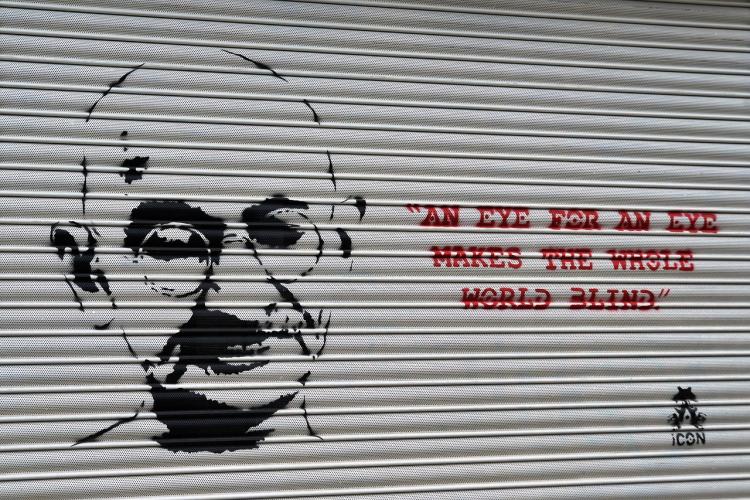
India is getting hot as the summer season takes hold. But the hot weather, this year arriving earlier and feeling hotter comes with a chill in the economy. Can an early summer thaw the consumption chill? Will the former salvage the latter? Many economists hold out the hope that FMCG will sell more fizzy sodas and squashes, more cleansing lotions and deodorants. Air-conditioners, coolers and fans will soon be in demand. The consumption story will pick up pace. This is a reasonable expectation from the frame of the modern economy.
Gandhiji did not give a religious sermon, but he did bring in religiosity by speaking about the moral value of regulating human beings’ lifestyles with limited material advancement
But isn’t it possible to change the frame? We have just passed the day, March 11, when in the year 1930, Mahatma Gandhi and his 79 chosen satyagrahis left the Sabarmati Ashram at 6 am for the famous Dandi March to break the Salt Law.
The description of that historic day, recorded in many documents, did not mention any unusual heat or rise in temperature. Since then, research data show that the annual mean temperature of Gujarat as a whole has increased. The rise in minimum temperature during the winter season was found to be higher than the rise in maximum temperature in the summer season, according to a paper (Ray, Mohanty, and Chincholikar) published in 2009 by the Ahmedabad Meteorological department. Another paper (Dash, Jenamani, Kalsi and Panda) published by Springer recorded evidence of climate change in 20th century India, including an increase in extreme temperature events. Dandi is seeing a high of 35 degrees Celsius this year in March.
Straight to the point of the economy and our consumption story, on 22 December 1916, Gandhiji addressed a gathering of economists in Allahabad. His lecture was titled “Does Economic Progress Clash with Real Progress?” Gandhiji said in the lecture, “Western nations today are groaning under the heel of the monster-God of materialism. Their moral growth has become stunted. They measure their progress in dollars. American wealth has become the standard … I have heard many of our countrymen say that we will gain American wealth but avoid its methods. I venture to suggest that such an attempt if it were made is foredoomed to failure” (Collected Works of Mahatma Gandhi Volume 13, pp 310-17).
There is increased if slower GDP growth, but the feeling of an economy stalled and citizens in distress is distinct
The doomsday prediction by Gandhiji may or may not have come true but adverse climate change is being felt sharply. One can argue that in the summer months (March-July) there is usually an increase in demand for some consumables such as cold drinks and ice-creams etc. Since 2016 alone, FMCG revenues have more than tripled. There is increased if slower GDP growth, but the feeling of an economy stalled and citizens in distress is distinct.
The hope that the higher variation seen in normal conditions (heat waves or extreme cold), the better for our economy is a position that is materially true in the short haul but also places Gandhi’s thoughts in their clear light. We now must depend on fluctuations in weather to help us push the economy, which of course is in part a cause of the fluctuations in the first place!
Are we not trapped in this vicious cycle? All this will of course lead to a steep hike in energy use, most of which is fossil fuel based. Carbon and other greenhouse gas emissions will increase. It will attract more public and private investments in technology and machines to produce low-carbon goods and services. Artificial Intelligence and super automation will tolerate fewer people at work to lower costs and be competitive. People without work will offer great scope to the State to dole out welfare schemes and social security.
More technical and specialised educational courses to deal with these problems will be introduced in universities charging fancy fees. This is “development” and modernity in full drive
The result: more towns and cities will be added to high and dangerously high air pollution levels for which mitigation efforts will further enhance the production of goods and services that will add to the GDP. More prosperity will lead to the demand for a rise in fossil fuel-driven motorised vehicles on roads. A sedentary life will give rise to lifestyle diseases like diabetes, hypertension, cardiovascular and cardio-respiratory problems.
Gandhiji called it the “monster-god of materialism”
More professional gymnasiums and more coaches will arrive on the scene alongside general and super speciality hospitals. More technical and specialised educational courses to deal with these problems will be introduced in universities charging fancy fees. This is “development” and modernity in full drive.
Not surprisingly, Gandhiji called it the “monster-god of materialism”. Gandhiji did not give a religious sermon, but he did bring in religiosity by speaking about the moral value of regulating human beings’ lifestyles with limited material advancement. The core of the problem lies somewhere else. More than a 100 years ago, Gandhiji was trying to show us that the path is unworkable. He wrote: “In a well-ordered society, the securing of one's livelihood should be and is found to be the easiest thing in the world. Indeed, the test of orderliness in a country is not the number of millionaires it has, but the absence of starvation among its masses.”
We now must depend on fluctuations in weather to help us push the economy, which of course is in part a cause of the fluctuations in the first place
The threat to us from climate change is real. Human wisdom reflected in the SDGs or similar goals calls for a halt to unbridled consumption and GDP growth. The economists who see great GDP growth potentials in adverse climate conditions have turned into votaries of the monster-god of material progress. Gandhi reminds us of this simple truth.



